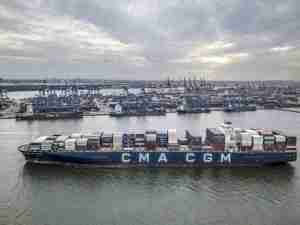By Peter A. Buxbaum, AJOT
Short-sea shipping in the United States could get a shot in the arm if a bill recently introduced in the House of Representatives becomes law. Representatives Stephanie Tubbs Jones (D-Ohio) and Phil English (R-PA), recently introduced the 'Great Lakes Short Sea Shipping Enhancement Act of 2007,' a measure which would exempt the movement of non-bulk commercial cargo on the Great Lakes from the Harbor Maintenance Tax.
Under current law, the Harbor Maintenance Tax (HMT) is assessed on cargo transported between US ports, and cargo imported to US ports from other countries. Because the HMT is only assessed on cargo if it moves by water, the tax serves as a disincentive to move trucks and their freight by water, according to the bill's sponsors. The legislation covers the movement of freight between US ports and between US and Canadian ports on the Great Lakes.
The HMT was created in 1987 and is imposed on cargo imported into the US through ports where the Army Corps of Engineers has spent money for improvement or maintenance. Little HMT revenue is raised from domestic freight movements. A 2005 study undertaken by the Short Sea Shipping Cooperative Program, an organization funded by the Maritime Administration, found that domestic container movements yielded the US treasury less than $2 million per year.
The bill is also designed to encourage the development of new shipping services on the Great Lakes, to create new maritime jobs in the region, and to relieve roadway congestion. It is hard to find anyone who finds fault with the measure.
'Domestic short sea shipping would provide an alternative to the already overburdened highways and railroads,' said Kurt Nagle, president of the American Association of Port Authorities. 'The Harbor Maintenance Tax has been identified as a cost disincentive to the development of this new industry. Trucking rates and rail rates are very competitive with short-sea shipping. Exempting certain domestic cargo from the Harbor Maintenance Tax would encourage the expansion of short sea shipping.'
'Some people don't appreciate the obstacle to short-sea shipping posed by the HMT,' added Gregg Ward, vice president of the Detroit-Windsor Truck Ferry. 'Having the HMT on Great Lakes trade doesn't benefit the government because the traffic doesn't exist.'
Ward's business occupies a niche service that ferries empty hazmat containers between the US and the Canadian sides of the lakes. Because that freight has a zero declared value, it is not subject to HMT. The HMT is levied at the rate of $125 for every $100,000 of declared value.
The Detroit-Windsor Truck Ferry does transport some critical freight when there are hiccups at the land crossings, Ward allowed. 'We get some auto freight when there are extreme waits at the border,' he said. 'The auto companies will bite the bullet and pay the HMT when the alternative is shutting a plant down.'
National security issue?
Ward views the development of short-sea shipping on the Great Lakes as a national security issue. 'Canada is our largest trading partner, and there are no alternatives to the bridges,' he said. 'Everyone is relying on aging infrastructure, but what if the Ambassador Bridge goes out? You'd have to drive 100 miles North to Port Huron, or 250 miles East to Fort Erie-Buffalo.'
Indeed, the Ambassador Bridge, which links Detroit, Michigan, and Windsor, Ontario, is considered the world's busiest border crossing, according to Collister Johnson, administrator of the Saint Lawrence Seaway Development Corporation. 'The bridge annually carries more cargo by value than the entire US imports received from Japan,' he said. 'As a result of the enormous volume of Canada-US trade, there is tremendous congestion at land border-crossing points. Traffic delays at the Ambassador Bridge of more than two hours during peak traffic periods are common.'
The current dearth of cross-lake short-sea shipping alternatives is due to 'c








